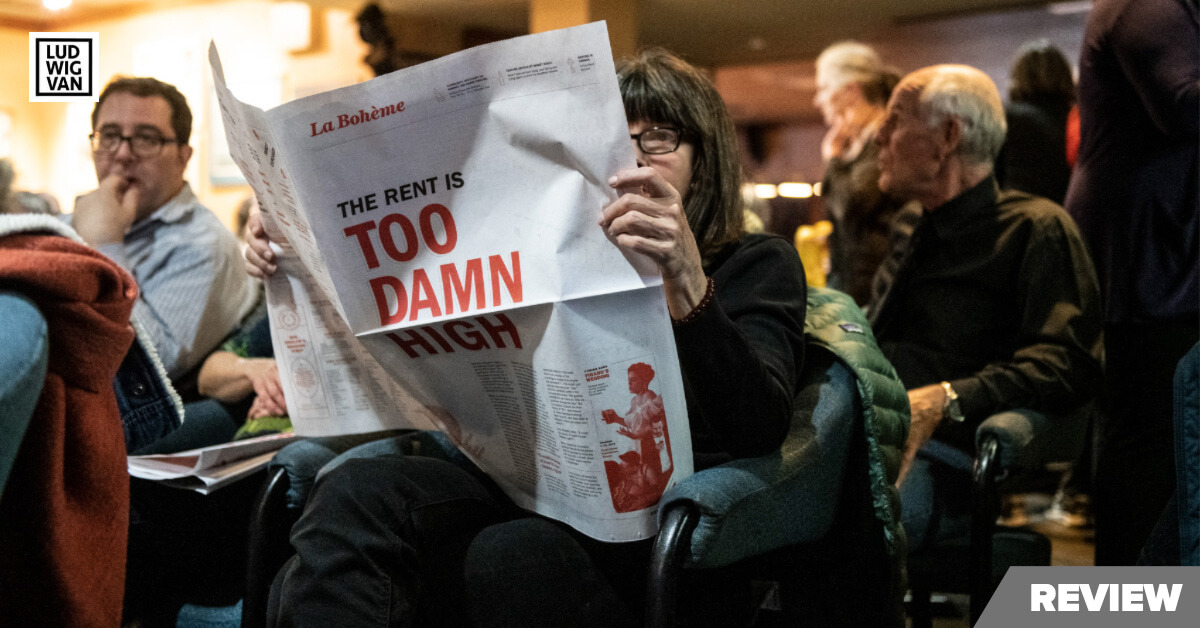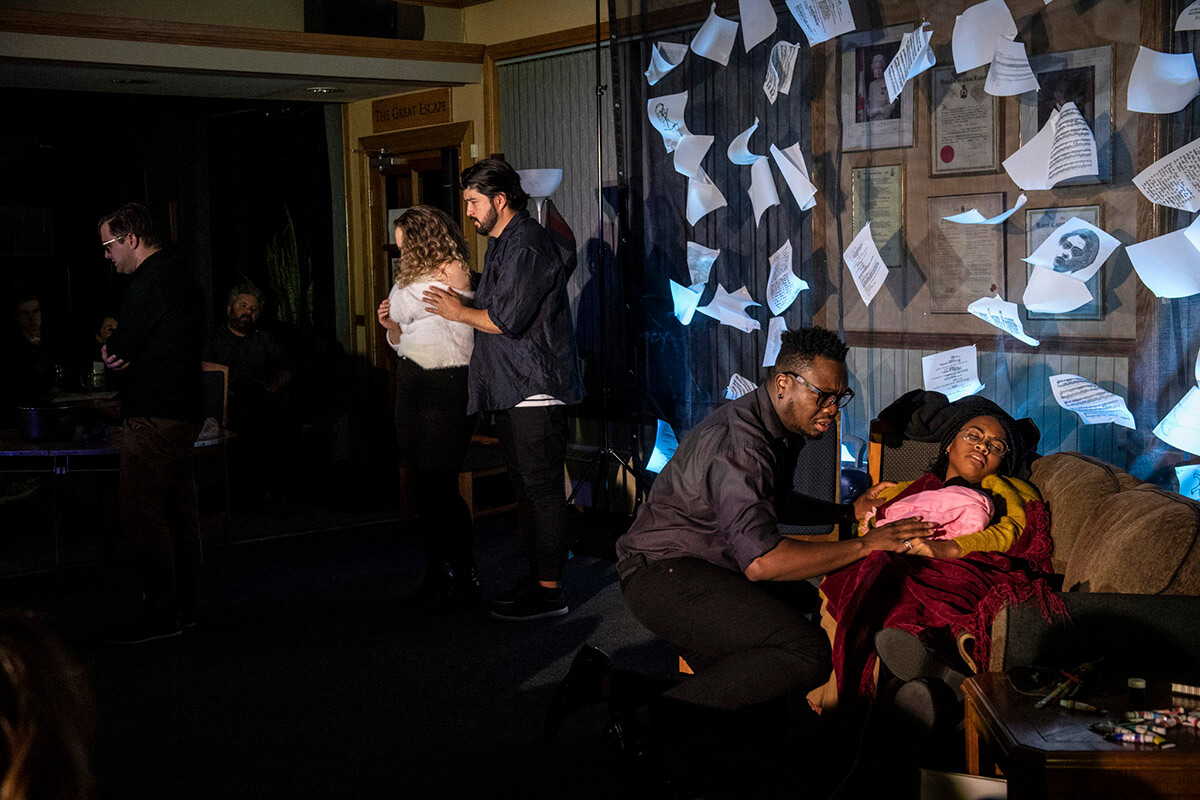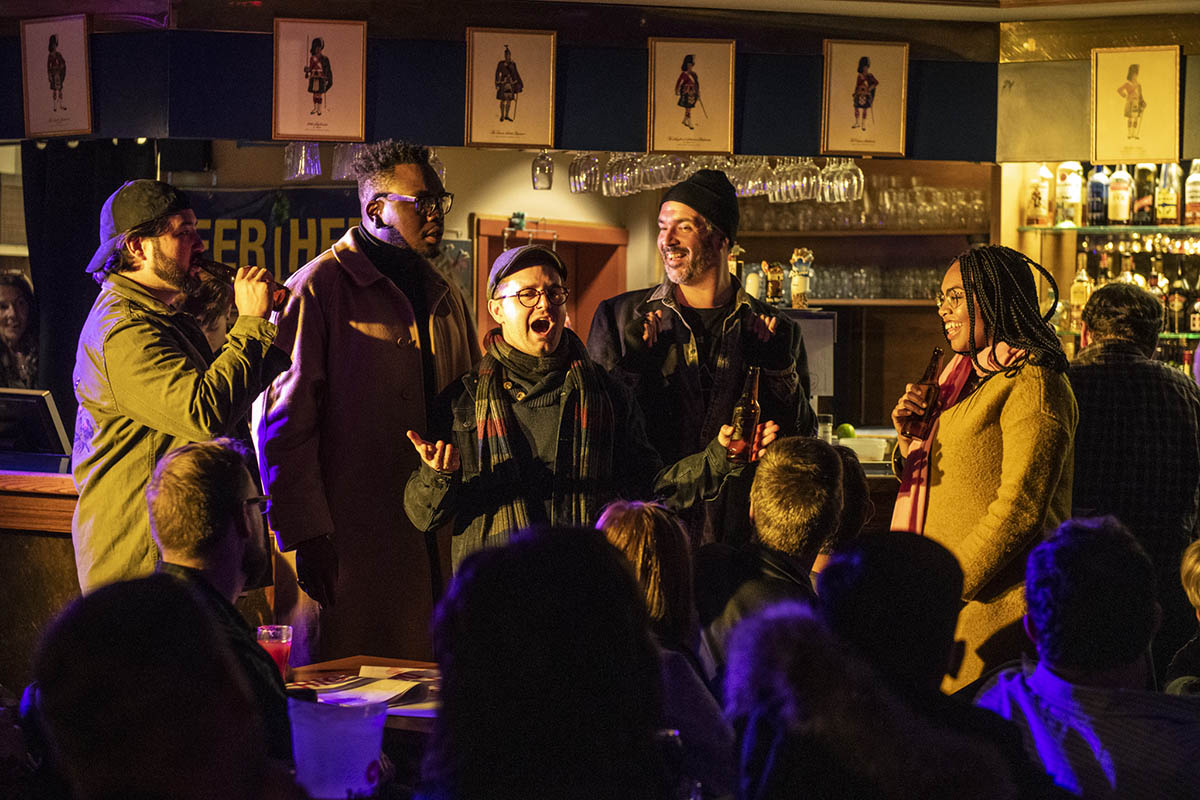
Against the Grain Theatre launched its tenth anniversary season with a second remounted La Bohème at a packed Tranzac Club Friday night, sparing little satire and hijinx in their updated transladaptation of Puccini’s classic. The difference this time was Ivany’s subtler and smarter direction, which emphasized less the Bohemian quarter of Paris transported to Bloor West and instead drew inspiration from the near-impossibility of living life in rent-hell Toronto.
Programs were printed in newspaper broadsheet format with protest headline (“The rent is too damn high”), mock ads, testimonials of what it is like to find any viable living space that isn’t really in an alleyway and abusive eviction stories from Bohème’s original fake landlord Benoît.
What makes this work, beyond the supreme cast and musicianship, is that Ivany revisits his productions and allows them to improve slowly and organically, supervising their growth over many years.
The result is relevant opera for our times that never has to try too hard to attain that relevance. It’s a smart strategy and it has allowed Against the Grain, coming off a Western Canada ten-city tour of La Bohème to effectively become Canada’s national opera company, with no real competition in sight. And with future stops in Whitehorse and Dawson City, where an original opera production has not been done in over a century, AgT could rightfully boost its claim to national relevance with their innovative and imaginative contemporary stagings.
And the news only gets better. CBC Gem will livestream Sunday’s performance of AtG’s La Bohème, the first broadcast of an opera in real-time in Canadian history, available to audiences across Canada at 8 pm ET (5 pm PT). The performance will also be broadcast worldwide on the CBC Arts YouTube channel.
It’s not hard to understand why, after seeing Bohème last night. Much is made of Ivany’s re-imagining of Puccini’s poor artists’ tale in bars across Canada. Certainly this is his original idea to tour the work, and the partnership with Banff Centre for Arts and Creativity alongside CBC Arts places him in an enviable position from which to launch such a campaign.

But often lost in the success of the production’s concept, initially launched back in 2011, is the fact that Ivany has jettisoned the original premise Puccini fell in love with which propelled him to write La Bohème in the first place.
La Bohème was a romanticized world co-opted by Puccini’s librettists Illica and Giocosa, in part to cash in on public imagination of what they thought was the glamorized Left Bank artists’ life in the Parisian Latin Quarter, an idealized creative existence which seemed to them (for the most part) to be one free of responsibility. Life was poor but good — in other words it was “la vie Bohème” and this novella setting came to be for Puccini his veritable theme of the opera.
But Ivany has overturned that whole idea for something better in our times. For my part, I did not see any of the four starving artist character archetypes as the central point of the production. Instead, with flower girl Mimì as the emblem of poverty’s many daily casualties, we were exposed to four members of the relegated underclass in Rodolpho, Marcello, Colline and Schaunard. There’s no heat, their base heater looks in part like Bender’s head from Futurama, but here held together with duct tape, and shopping at BMV is esteemed to be more important, and probably more affordable, than buying food.
There’s no glorifying or celebration of this life at all. Instead, the characters make the best of West End life, which is more a damn nuisance at times, but one which eventually carries serious consequences to art and relationships, strategies for survival (especially for the female characters, which hasn’t changed at all in over a century) and ultimately, life and death.
It was from this perspective, ensconced within a carefully unfolding backdrop of contemporary poverty that helped me to understand the casting and the production and how the voices were uniformly perfect in characterization.
It was my privilege to hear the truly special Jonelle Sills again last night, this time singing the role of Mimì and my second time in three months watching her perform after reviewing her moving performance in Banff’s production of Paola Prestini’s Silent Light in July. Sills is the kind of talent that rarely comes along, replete with power in her top from both head and chest but rich in the subtler lower end too if even a little quiet. I found her Mimì mesmerizing as both an actor and a singer, producing swells and different colour-volumes with a naturalness of hue and tone, blended with an ease we don’t often get to see. My hope is that audiences cheer her for being the rising star she is, one in need of a home in the bigger houses as her voice continues to only grow more and develop further. Jonelle Sills is a thrill.
The four men were perfect in timing throughout and very different in vocal type. Marcel D’Entremont’s Rodolfo was everything you would want him to be — vulnerable, funny, clever in his writerly way, a total pinhead in how he treats Mimì, and then remorseful over his own shallowness. His power and inflection, a genuine harmonic feel for every single phrase and especially his impeccable actor’s gift made the show possible. Let’s have more of him soon.
Right alongside him was Clarence Frazer’s outstanding Marcello. He was the perfect best friend, dupe of Musetta, and the one man who knew how to slap some sense into his friend when he needed it most. Above all, Frazer is so naturally gifted, he can walk into any role and make it sound like it was meant for him to sing. Frazer presents a unique kind of musical performative power that demands a wider audience in a myriad of differing roles, types and genres.

It is likewise so with Giles Tomkins’ Colline. His unforgettable and poignant farewell to his overcoat in Act IV will go down as one of the best I have heard live or on recording in decades. Sincere, irreverent, consummately musical at every step, he was the role, wearing his status on his sleeve for us all to see. It was ironic that so much could be said about a life without a regular meal through brazen and well-acted comedy.
But he had help from an equally remarkable performer, the wonderful Andrew Adridge, whose depiction of a haplessly unmusical sax player Schaunard was the comic highlight of the night. Act II alone at the bar should be studied again and again by any aspiring singer to watch Adridge give so much through his eyes, facial expression and tremendous talent for physical comedy. And by the way, he does all that by singing equally well too.
It all worked well with Danika Lorèn’s good-time Musetta, a character all too often two-dimensionalized into irrelevance. Instead, she serves as foil to all the men and not just Marcello, dominating the stage with her strut and musical acumen. And her leading Gregory Finney’s Alcindoro around by the nose was hilarious.
One of the prime ingredients of the opera is that there is so much to do in the ensemble casting. The timing was split-second, bracing even, in the Act II bar scene. It was a total pleasure to watch a raw energy seldom witnessed in any opera setting blanket the Tranzac Club with so much going on. On one side Adridge and Tomkins make bets with one another on how well their pal Marcello will hold out against Musetta’s advances as Lorèn puts on a virtuoso display seducing her former lover Marcello, played to perfect befuddled consternation by Fraser. Meanwhile, on the left side of the bar, D’Entremont’s Rodolfo is newly united with Sills’ Mimì, both singing perfectly well in lyrical counterpoint into a brick and drywall acoustic. It was a great scene, musically, dramatically and for its stunning comic timing.
This is only one of several scenes where Puccini makes so much happen on stage but directors largely refuse to mind the gold available to them for premium effect. Ivany doesn’t shirk any possibilities here. The entire act is not only funny and energetically unbelievable to watch and hear, it’s also a testimony to the lurking untapped potential of opera’s immediacy when performed in close quarters that presses beyond mere “breaking the fourth wall” comparisons. We live inside the Bohemians’ world here and feel their lives and their loves too, all to constructive purpose.
It is much the case in Act III when Mimì and Rodolfo patch up their differences in a psychologically complex scene buttressed with Marcello and Musetta brawling about their own relationship. Ivany places the brawl in sharp relief downstage, while upstage the tender reconciliation enshrining Rodolfo’s and Mimì’s resolve to remain together until spring, somehow musically finds its through-path around the volcanic violence Fraser and Lorèn spew from stage centre. It’s one of many brilliantly directed moments underscoring the often subterranean violence of poverty, hidden away in back alleys and impoverished housing where people cannot afford to live nor even acquire the often necessary medical treatment they need, with desperate consequences of contemporary resonance.
In most ways, that summarizes not just the opera, but Ivany’s view of life too, which seems to permeate all his productions. Ivany allows the slapstick comic to thrive seamlessly side by side with the appalling and the tragic — no easy directorial feat. But after ten years of Against the Grain, Ivany has achieved something theatrically natural, allowing the most difficult-to-depict, irreconcilably opposite cornerstones of human life to speak eloquently for themselves, without forcing his point.
Under Ivany, this poverty-tale Bohème speaks perfectly for itself. And like the broadsheet programme stated “[we] started from the bottom, now we’re on a national tour.” There is something very clearly appealing in this kind of theatre that many audiences across the country are now taking notice.
Other opera companies had better start taking notes.
#LUDWIGVAN
Want more updates on classical music and opera news and reviews? Follow us on Facebook, Instagram or Twitter for all the latest.
- SCRUTINY | Opera Atelier’s Film Of Handel’s ‘The Resurrection’ A Stylish And Dramatic Triumph - May 28, 2021
- HOT TAKE | James Ehnes And Stewart Goodyear Set The Virtual Standard For Beethoven 250 - December 15, 2020
- SCRUTINY | Against the Grain’s ‘Messiah/Complex’ Finds A Radical Strength - December 14, 2020



